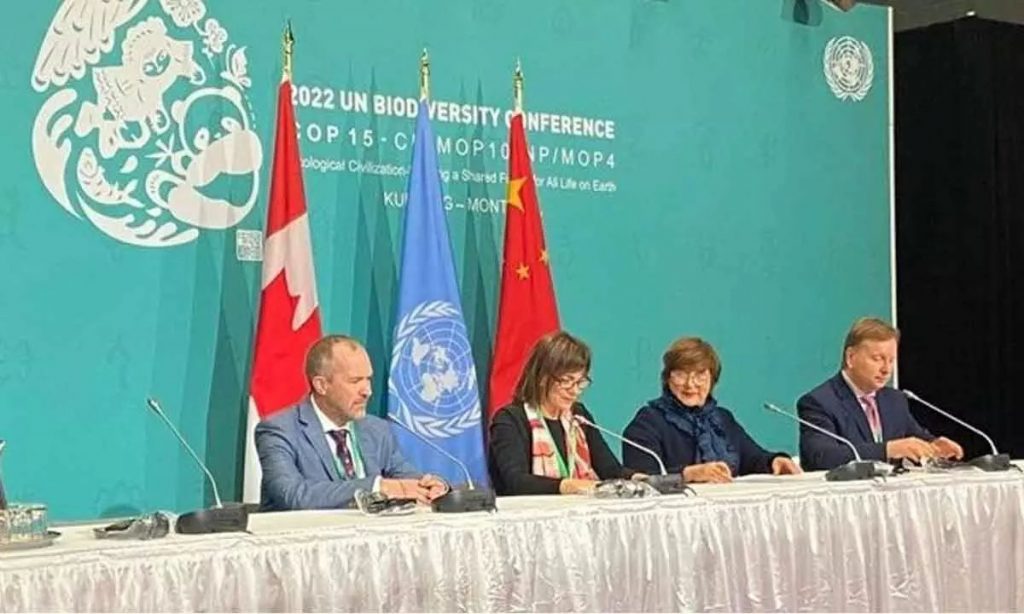COP15: A Pact for Nature’s Recovery

Finally, after years of negotiations and a tumultuous couple of weeks at CBD COP15, there is good news from Montreal – a new ‘Pact for Nature’ – and an opportunity for Travel & Tourism to establish itself as a ’Force of Good’.
…
The historic plan for nature was finalised in the early hours of this morning (19th December) to cheers from delegates and impassioned speeches by world leaders. It was presented as the “last chance” to put nature on a path to recovery. Having experienced the last week myself, with up-to-the-wire negotiations, the news of a positive outcome is a huge relief.
“Nature is our ship. We must ensure it stays afloat,” said EU Commissioner for Environment, Oceans and Fisheries, Virginijus Sinkevicius.
The Global Biodiversity Framework, the agreed plan for nature, sets out ambitious yet achievable plans to increase protected areas to 30% of the planet, safeguarding vital ecosystems from rainforests to wetlands, and to halt and reverse biodiversity loss by 2030. It includes four goals and 23 targets ranging from the sustainable use of natural resources and the reduction of pollution to the restoration of destroyed habitats.
“It is truly a moment that will mark history as Paris did for climate,” hailed Steven Guilbeault, Canada’s Minister for the Environment and Climate Change.
However, we cannot afford to be complacent. We are still experiencing the sharpest decline in biodiversity and habitat loss in human history. It is acknowledged that this new pact for nature cannot be delivered unless the whole of society is involved. In the last week of negotiations, businesses, in particular Travel & Tourism, were recognised as a key driver of positive change, with the ability to deliver short-term goals where government efforts often fail.
Last week I had the pleasure of working on behalf of the World Travel & Tourism Council, the voice of our industry’s private sector, and together with the UN World Tourism Organisation (UNWTO) and the Sustainable Hospitality Alliance (SHA), to promote ’Nature Positive Tourism’. In a momentous announcement at COP15, these Travel & Tourism heavyweights acknowledged the importance of nature and the sector’s ability, as a global industry that operates at all levels of society, to become a ’Guardian of Nature’. They were united in their commitment to not only assist in the delivery of the Global Biodiversity Framework but, through the formation of a Nature Positive Tourism Alliance, to drive forward capacity-building action for businesses, the value chain, and global destinations.
Julia Simpson, WTTC President & CEO, said: “Travel and nature are intrinsically linked. Wildlife tourism creates over $340BN USD each year and supports more than 21 million jobs around the world. Today’s collaboration between WTTC, UNWTO and the Sustainable Hospitality Alliance, spearheading the sector’s vision to halt and reverse nature loss by 2030, shows our commitment to preserve the planet for future generations.”
Zoritsa Urosevic, Executive Director at UNWTO and Special Representative to the United Nations in Geneva, said: “As part of the broad Alliance of stakeholders for ‘Nature Positive Travel & Tourism’, UNWTO shows its commitment to the Global Biodiversity Framework of COP15 – making tourism the Guardian of Nature. New governance and business models, enhanced capacity to monitor positive change and scaling up green jobs are all part of the solution as we move ahead together.”
Glenn Mandziuk, CEO of the Sustainable Hospitality Alliance (SHA) said: “As an industry that relies on our natural world for everything from our buildings to attracting guests to outstanding locations across the globe, we recognise the immense importance of protecting our beautiful planet. Collaboration across sectors and across borders is essential to halt and reverse biodiversity loss… and make Nature Positive Tourism a reality.”

Dreams certainly became reality for ANIMONDIAL: not only by participating in a biodiversity COP but, off the back of our co-authored “Nature Positive Travel & Tourism” report with WTTC, by facilitating the establishment of the Nature Positive Tourism Alliance and gaining government support for the initiative.
Our efforts at COP15 efforts culminated in a statement to the High Level Segment of proceedings, when UNWTO said: “Together, the Alliance will support and inspire governments, business, and society to implement the Global Biodiversity Framework … help transform humanity’s relationship with the natural world, and through investment in global destinations, help support national biodiversity strategies and efforts to achieve the 30×30 Targets, and so allow these destinations to become true ’Guardians of Nature’.”
Actions will, of course, be more important than words, and the ability of the Nature Positive Tourism Alliance to deliver on the Global Biodiversity Framework will be the testament to its success. Work begins in January 2023 with the development of an implementation plan and by defining key outputs, but until then we can all celebrate that COP15 could not have had a better outcome for Travel & Tourism.
Global Biodiversity Framework main commitments:
- Integrate biodiversity safeguards into policies, regulations, spatial and urban planning, and development processes, poverty eradication strategies, and environmental assessments, across all sectors;
- Ensure that the use, harvesting and trade of wild species is sustainable, safe and legal, preventing overexploitation;
- Minimise the impact of climate change on biodiversity through Nature-based Solutions, reduce pollution risks and the negative impact of pollution to levels that are not harmful to biodiversity, and reduce the introduction and establishment of known or potential invasive species by 50%, by 2030;
- Encourage and enable businesses to regularly monitor, assess, and transparently disclose their risks, dependencies and impacts on biodiversity along with their operations, supply and value chains and portfolios, as a mechanism to progressively reduce negative impacts on biodiversity;
- Ensure that people are encouraged and enabled to make sustainable consumption choices;
- Ensure that all actions respect and protect the rights of, and customary sustainable use by, indigenous peoples and local communities.
On behalf of ANIMONDIAL, I’d like to wish you Seasons Greetings, and a Nature Positive 2023!
» Read the finalised Global Biodiversity Framework
» Demonstrate your business’ support by signing on to the Vision for Nature Positive Tourism Nature Positive Tourism
» Discover your business’ risks, dependencies and impacts on biodiversity. The online Nature Positive Evaluation Tool for Travel & Tourism, enabling your business to discover its impact on nature and take the necessary steps to protect & restore it.

